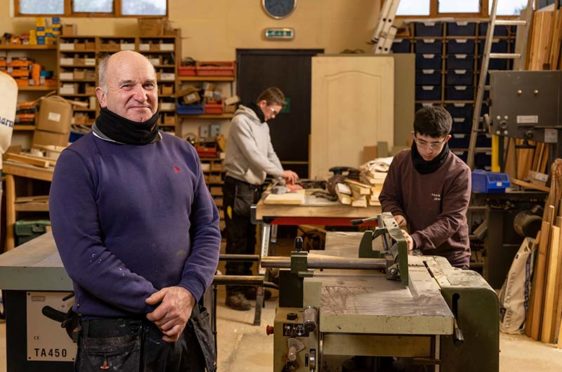Many employers across Scotland have continued to recruit or retain apprentices during the pandemic, developing new ways of working to ensure their talent continues to add value and their businesses remain resilient.
The benefits of offering a young person a chance through an apprenticeship not only brings new talent into the organisation, it also strengthens a business in the long term.
For business owner Jack Duncan, apprentices have always featured highly in his working life – one that spans more than four decades.
The proprietor of John P Duncan Joiners and Roofers, a long-established family business based in Alford, Aberdeenshire, currently has three teenage apprentices – but they are by no means the first.
Not only has he and wife Bud, who also co-owns the company, taken on their own apprentices over the years, they have also taken on other companies’ apprentices who were made redundant, giving them a chance to complete their training and retaining them thereafter.
“I’ve always had apprentices since I started 42 years ago,” Jack explained, “and they work alongside the tradesmen, as well as going to college part-time where they learn a lot, including subjects like health and safety.”
Apprentices have positively impacted the family-run firm for decades and have helped boost its long-term future by bringing fresh talent, ideas and skills into the well-established and well-known joinery and roofing business.
Jack added: “Apprentices can bring a great energy to the workplace, as well as different skills that we can use to keep up with the changes, which seem to be happening quicker and quicker.”
He explained one of the other main benefits of having apprentices join the business, which tackles everything from small joinery and roofing jobs to large-scale projects, is that you can “train them exactly the way you work”, rather than coming in having worked a different way with another company.
“There’s also no guarantee they will have been properly trained or, although they have experience in joinery or roofing, their previous jobs might have been limited in the type of work they have done.”
And Jack has seen some of his former apprentices stay with him for years after they become time-served tradespeople, before going on to launch their own businesses or progress their careers elsewhere.
“It’s a point of pride to see them doing so well given that I helped them get started and trained them,” he pointed out.
Even during lockdown last year, Jack recruited two new apprentices and managed to retain his other apprentices’ roles by placing them on furlough, to allow them to keep their job and learning as much as possible.
“They certainly learned about PPE,” Jack said.
“But we have never stopped so they could continue to work .”
Looking to the future, Jack does not see any sign of John P Duncan stopping recruitment of apprentices.
In fact, he says he will continue to employ apprentices because it helps keep traditional trades alive: “Apprenticeships have always been a good thing and I think they always will be a good thing – not just because they’re a good way to get and train new members of staff, but also because it’s passing on trade skills that aren’t as common as they used to be.”
£5,000 available to take on new blood
Additional support for employers has been put in place through Skills Development Scotland as part of the response to Covid-19 to support apprenticeships.
The Apprenticeship Employer Grant provides up to £5,000 to employers taking on a modern or graduate apprentice.
If applications are for upskilling existing employees, the grant specifically supports those who have changed job roles within the last four months.
Funding for the grant is available for eligible employers where the apprenticeship start date was on or after December 1 and it will remain available until March 25, or until funding levels are exceeded, whichever comes first.
Payments for employers recruiting apprentices who have been made redundant during the pandemic are being increased from £2,000 to £5,000 through the Adopt an Apprentice scheme.
Across Scotland, apprentices are employed in a wide variety of roles covered by more than 100 different types of Scottish apprenticeships.
Apprentice employer surveys by Skills Development Scotland reveal apprenticeships bring skills and improve sustainability and productivity with 100% of employers who took on graduate apprentices, with them agreeing they would take another on in the future and 87% stating it improved workforce sustainability.
For more information, or to upload apprenticeship vacancies, visit: apprenticeships.scot
